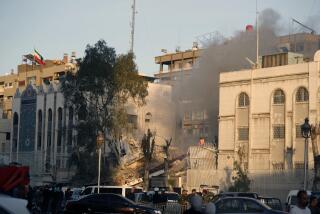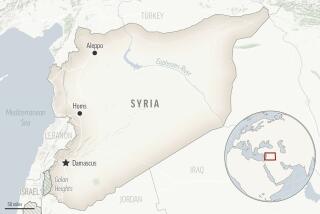Internet, phone access restored in Syria capital
BEIRUT — Internet and telephone service were restored to the Syrian capital Saturday, two days after a nationwide communications blackout spurred fear of new attacks and left anxious Syrians in and outside the country unable to contact loved ones and friends.
The government also declared Saturday that Damascus’ international airport was “safe” and that flights were “running normally” after clashes on the airport road had led to some flight cancellations.
The feeling that the capital was being cut off prompted a flurry of rumors of a likely new upheaval in a nation where 20 months of bloody conflict has left thousands dead and forced millions from their homes.
But the Syrian government — which has suffered a steady erosion of territory, military bases and infrastructure in recent weeks — moved Saturday to quell any sense that it was losing its grip on power.
“All Internet and communications services in Damascus were back in service after technical workshops completed repairing the failure that caused the cutoff,” the official Syrian Arab News Agency reported.
It was unclear, however, whether access had been completely restored outside the Damascus area.
On Thursday, global Internet monitors reported that virtually the entire country had lost contact with the Web. The government said the problem was confined to the Damascus area. The cause of the communications blackout remained a public mystery.
Syrian authorities initially blamed “terrorists” — its standard term for armed rebels — for cutting communication lines. The opposition said the government of President Bashar Assad had pulled the plug on Internet and phone service.
In its statement Saturday, the official news service cited “a failure in the main network” outside Damascus, without elaborating. The latest explanation seemed to contradict the earlier suggestion that the system had been subject to rebel sabotage.
In accusing the government of blocking Internet access, opponents cited at least two possible motives: to conceal preparations for large-scale military operations or to prevent the public from seeing Internet video of escalating combat near the capital and elsewhere.
With journalists’ access limited, online amateur videos have become a major source of information about what is happening in Syria. Authorities have sometimes imposed local communications blackouts, typically during security operations, but until last week the nation had never been plunged into near-total Internet darkness.
As the country came back online, Syrians at home and abroad expressed relief.
“After all, now I know what is happening with family and friends,” said Kinan, 34, a Syrian living in New York who, like others, asked to be identified by only his first name. “Yet, at the same time, this is just one more thing. I mean, it’s just one crisis after another.”
A BBC correspondent in Damascus tweeted that “a sense of excitement” greeted word of the Internet restoration, with patrons of one cafe cheering the news.
“Felt as if back to life,” wrote the BBC reporter, Lina Sinjab.
During much of the conflict, telephone lines and Internet communication — via Skype, email, Facebook and other forums — had allowed people to keep in touch. The two-day communications outage worsened an already profound sense of insecurity.
“Can anyone tell me how can I contact people in Damascus?” a Syrian painter living outside the country wrote on Facebook after the Internet went down, provoking a flurry of responses such as, “Try text messaging. My mother was able to write me back from Damascus.”
During the outage, many Syrian exiles used the same Facebook and Twitter message — “This is Damascus” — in solidarity with those in the country. The declaration, similar to WWII’s “This is London” radio broadcasts, actually echoes how, during the 1956 Suez crisis, Syrian radio began its broadcasts with “This is Cairo, from Damascus” after warplanes had knocked out Egyptian radio.
“From Montreal, this is Damascus,” read one such message last week, while another said, “From the bottom of my heart in Amman, this is Damascus.”
Meanwhile, fierce clashes were reported Saturday near Damascus and elsewhere in the country.
Government artillery, fighter jets and assault helicopters pounded districts and suburbs of Damascus, including Assali, Dariya, Qadam, Qaboun, Hajar Aswad and Kafar Sousa, said a rebel spokesman in the capital.
The government news service reported that troops “destroyed dens and gatherings for terrorists” in several Damascus-area towns, including Dariya and Duma, longtime rebel strongholds.
A pro-opposition group, the Britain-based Syrian Observatory for Human Rights, said the death toll Saturday across the country had reached at least 110.
The opposition says as many as 40,000 people have died in the conflict. The government has not provided casualty figures.
Bulos is a special correspondent. Times special correspondent Rima Marrouch and a Times staff writer in Amman, Jordan, contributed to this report.
More to Read
Start your day right
Sign up for Essential California for news, features and recommendations from the L.A. Times and beyond in your inbox six days a week.
You may occasionally receive promotional content from the Los Angeles Times.







